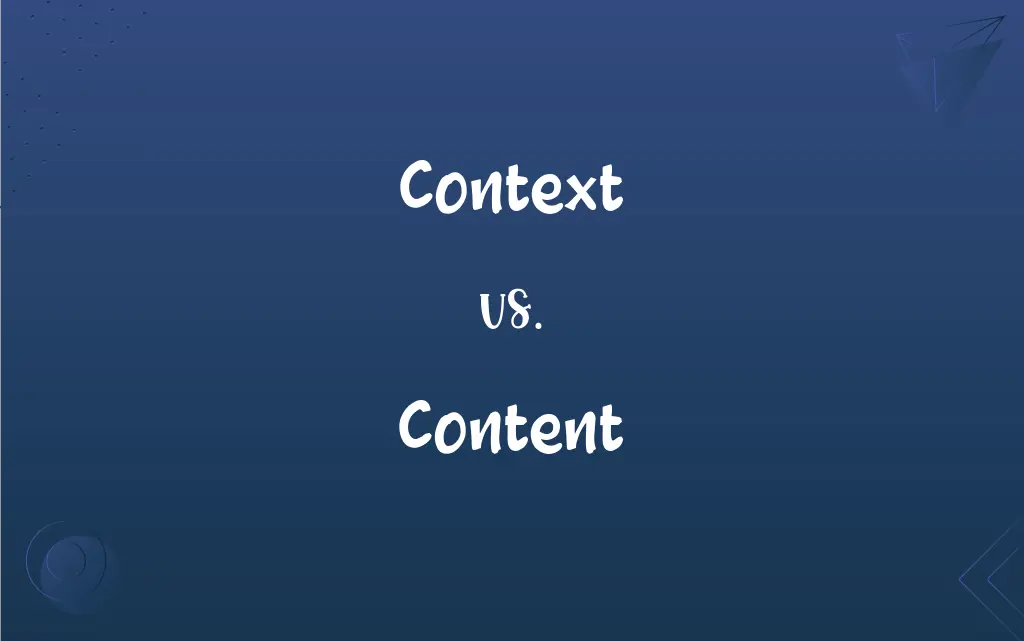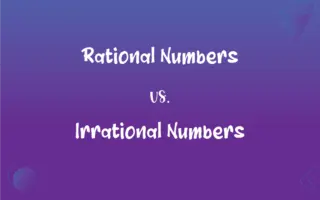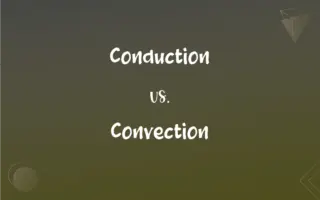Context vs. Content: What's the Difference?
Edited by Aimie Carlson || By Harlon Moss || Updated on June 9, 2024
Context refers to circumstances forming a background for something, while content means the substance or material dealt with in a speech, piece of writing, or work of art.

Key Differences
The word context implies the conditions or circumstances that envelop a particular event, statement, or idea, and through which the latter can be fully understood. In essence, context provides a backdrop that imparts meaning or clarity, helping recipients grasp the embedded implications or nuances. Conversely, content encapsulates the tangible or visible elements present within something, like the words in a book or the images in a movie, basically representing the primary material or substance being referred to or encountered.
In communication and various forms of media, context can serve to enhance understanding or alter perception by providing relevant background information, historical data, or related events. This auxiliary information helps individuals to decode intended meanings, avoid misinterpretations, and align comprehensions with intended messages. Meanwhile, content stands as the core message, information, or elements being conveyed, which might include text, images, sounds, facts, or any other informative material.
Within different disciplines, context and content play pivotal roles in shaping, directing, and interpreting information. For instance, in journalism, context might involve the socio-political environments surrounding an event, thereby influencing how readers interpret presented news. Whereas content, in the same scenario, represents the actual news items, data, and specifics reported by the journalist, forming the principal substance of the news piece.
Moreover, context often acts as a lens through which content is interpreted, implying that the same content might be perceived differently when placed within varying contexts. A statement, piece of artwork, or historical event might be read, viewed, or understood distinctively when the surrounding circumstances, intents, or environments (context) are altered, showcasing the interplay between the two concepts.
While context often requires inferential and analytical skills to comprehend its implications on the primary information, content is typically direct, explicit, and can be absorbed through straightforward observation or consumption. Context asks individuals to read between the lines, while content is the actual lines being read.
ADVERTISEMENT
Comparison Chart
Definition
Circumstances or settings enveloping a particular event or statement
The substantial or material part of something
Role
Provides background and understanding
Delivers primary information or message
Involvement in Interpretation
Influences or shapes perception and interpretation
Serves as the material to be interpreted
Application
Auxiliary, aids in deciphering meanings
Central, is the main subject matter
Directness
Indirect, requiring inferential thinking
Direct, offering clear and tangible information
ADVERTISEMENT
Context and Content Definitions
Context
Context is the backdrop that gives meaning to an event or statement.
The historical context illuminated the significance of the landmark.
Content
Content refers to the substantive information, elements, or topics encompassed within a medium.
The content of the book offered deep insights into human psychology.
Context
Context encompasses circumstances that clarify or alter perceptions.
Understanding the cultural context enhanced the depth of the novel.
Content
Content is the amalgamation of primary, directly accessible data or details within a communication.
The content of the speech was powerful and moved the audience.
Context
Context refers to the ancillary information that aids in interpretation.
The artist’s personal context added layers to the artwork’s interpretation.
Content
Content denotes the tangible materials, such as text, images, or sounds, present within a communication form.
The content of the website was rich with useful resources.
Context
Context denotes the conditions or settings surrounding a particular scenario.
The economic context influenced policy-making decisions.
Content
Content encompasses the principal themes, messages, or topics being communicated or explored.
The content of the letter was joyful and uplifting.
Context
Context involves external factors that impact understanding or meaning.
The political context shaped the reception of the ambassador’s speech.
Content
Content encapsulates the essential or fundamental entities, materials, or ideas contained within something.
The content of the presentation was technical yet engaging.
Context
The part of a text or statement that surrounds a particular word or passage and determines its meaning.
Content
Often contents Something contained, as in a receptacle
The contents of my desk drawer.
The contents of an aerosol can.
Context
The circumstances in which an event occurs; a setting.
Content
The individual items or topics that are dealt with in a publication or document
A table of contents.
Context
The surroundings, circumstances, environment, background or settings that determine, specify, or clarify the meaning of an event or other occurrence.
In what context did your attack on him happen? - We had a pretty tense relationship at the time, and when he insulted me I snapped.
Content
The material, including text and images, that constitutes a publication or document.
FAQs
What is the basic definition of context?
Context refers to the circumstances or background that give meaning to an event, statement, or idea.
What is the role of historical context?
Historical context provides background related to the time and conditions in which an event or communication took place.
Can context alter the perception of content?
Yes, context can shape how the content is perceived and interpreted by providing additional information or framing.
How does context influence communication?
Context provides background information that can shape understanding and interpretation of communication.
How does content drive online platforms?
Content provides the substance that engages users, drives discussions, and disseminates information on online platforms.
How is context used in literature?
In literature, context can provide background on the author’s life, the social and political era, or other factors that influence interpretation.
What is the definition of content?
Content refers to the actual material, information, or topics contained within a medium of communication.
How does one evaluate the quality of content?
Quality content is typically accurate, relevant, engaging, and tailored to the target audience.
How is context crucial in legal scenarios?
Legal context helps to understand the circumstances and backgrounds that influence legal decisions and interpretations.
Can context and content contradict each other?
Yes, sometimes content and context might seem to convey different messages, creating complexity in interpretation.
What is a practical example of content in education?
Content in education includes the topics, materials, and information conveyed through educational resources.
How is context related to culture?
Cultural context relates to the customs, beliefs, and societal norms that influence understanding and interpretation.
Can content exist without context?
Content can exist without context, but context often enriches understanding and provides depth to content.
How does content differ across various media?
Content can vary by medium, changing in format, depth, and type, like text in books or visuals in videos.
Why is balancing content and context important in communication?
Balancing content and context ensures that the main message is clear while also being enriched and correctly interpreted through relevant background information.
How is content curated in media?
Content curation involves gathering, selecting, and presenting content relevant to a particular topic or audience.
How does context impact art interpretation?
Context provides background on the artist, era, and influences, often shaping how art is interpreted and valued.
Can context be multifaceted and layered?
Yes, context can have multiple layers, like cultural, historical, and social, each influencing interpretation differently.
What is an example of content in digital media?
Content in digital media might include text, images, videos, and interactive elements on websites or apps.
What is an example of context in social scenarios?
Social context could involve norms, interpersonal relationships, and societal structures influencing social interactions.
About Author
Written by
Harlon MossHarlon is a seasoned quality moderator and accomplished content writer for Difference Wiki. An alumnus of the prestigious University of California, he earned his degree in Computer Science. Leveraging his academic background, Harlon brings a meticulous and informed perspective to his work, ensuring content accuracy and excellence.
Edited by
Aimie CarlsonAimie Carlson, holding a master's degree in English literature, is a fervent English language enthusiast. She lends her writing talents to Difference Wiki, a prominent website that specializes in comparisons, offering readers insightful analyses that both captivate and inform.































































